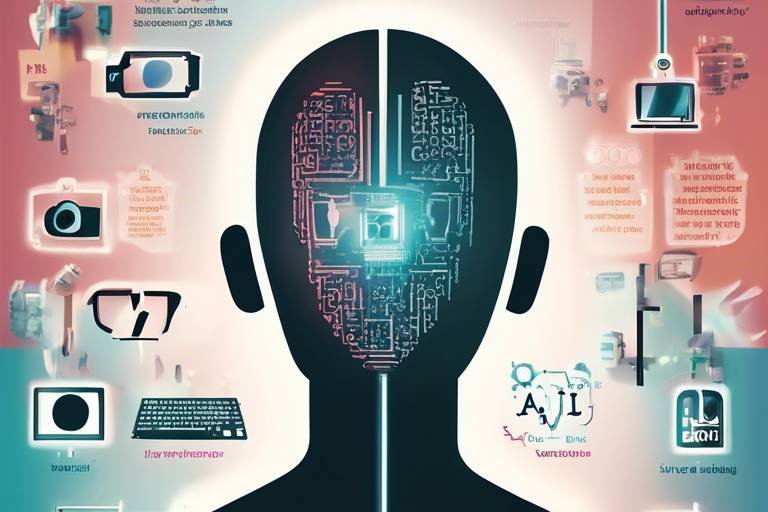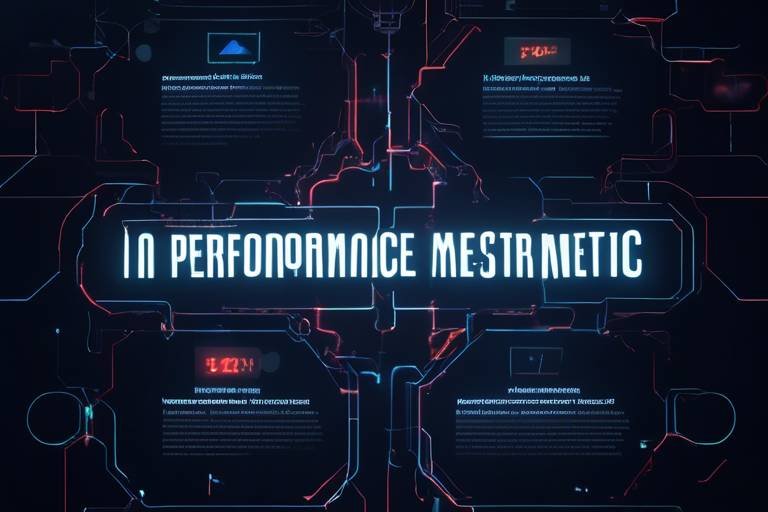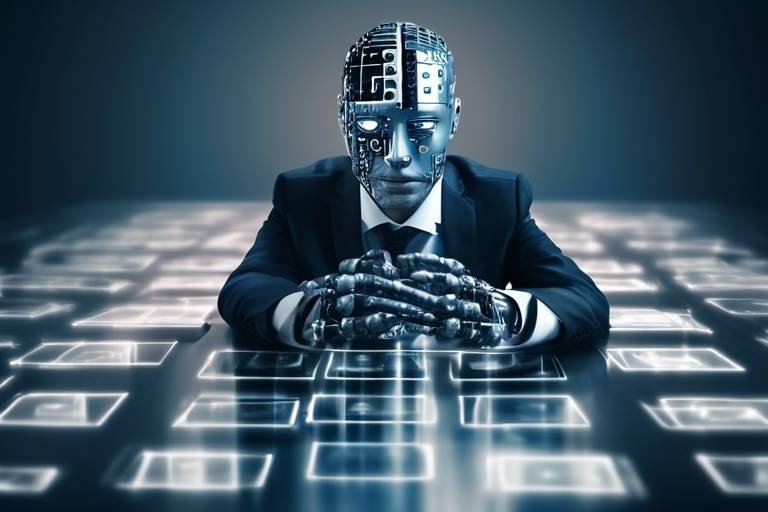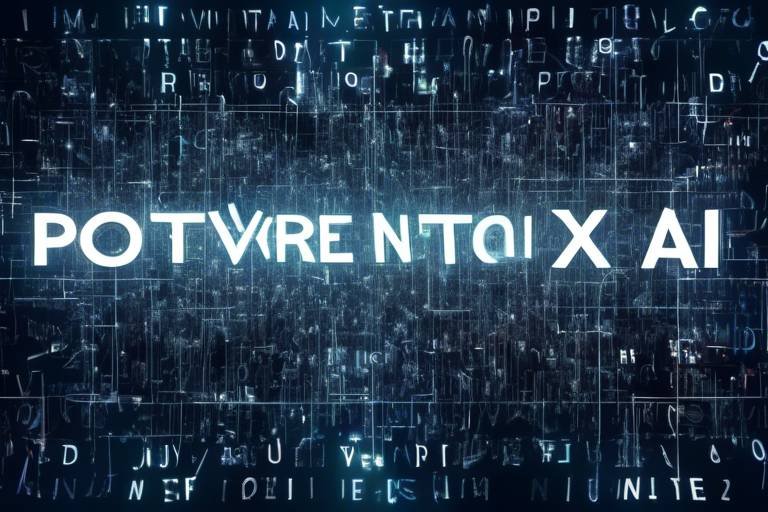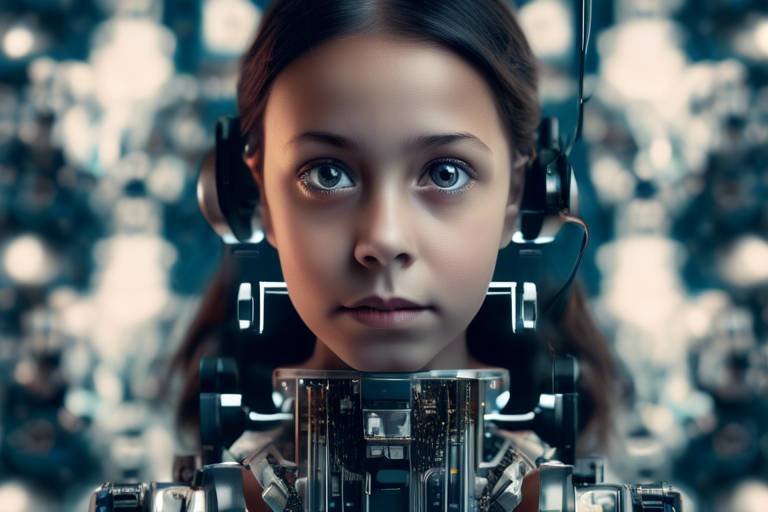How AI & Ethics Impact Everyday Life
Artificial Intelligence (AI) is not just a futuristic concept anymore; it's woven into the fabric of our everyday lives. From the moment we wake up to the sound of our smart assistants to the personalized recommendations that pop up on our streaming services, AI is enhancing convenience and efficiency in ways we often take for granted. But as we embrace these technological advancements, we must also confront the ethical implications that come along with them. How do we balance the benefits of AI with the potential risks it poses to our privacy and autonomy? This article delves into the intricate dance between AI and ethics, exploring how these two powerful forces shape our daily experiences, influence our decision-making processes, and redefine societal norms.
Think about it: when was the last time you used your smartphone without interacting with some form of AI? Whether it’s voice recognition, chatbots, or recommendation algorithms, AI has become a fundamental part of our daily routines. These technologies enhance our lives by providing tailored experiences that save us time and effort. For instance, smart home devices learn our habits and preferences, adjusting settings to create a comfortable living environment. However, this convenience comes at a cost. As we grow more reliant on AI, we must ask ourselves: are we sacrificing our privacy for ease of use? The trade-offs between convenience and security are crucial considerations in our increasingly digital world.
As we stand on the brink of an AI-powered future, the ethical considerations surrounding AI development are more pressing than ever. It’s not just about creating smarter machines; it’s about ensuring these machines operate fairly and responsibly. One significant concern is the potential for bias in AI algorithms. If the data used to train these systems is flawed, the outcomes can perpetuate existing inequalities, leading to unfair treatment in critical areas like hiring and law enforcement. This raises the question of accountability: who is responsible when an AI system makes a mistake? Understanding the ethical framework guiding AI innovation is essential to navigate these challenges.
Bias in AI is not just a technical issue; it's a societal one. AI systems can unintentionally mirror the biases present in their training data, leading to outcomes that can adversely affect marginalized groups. For example, if an AI algorithm used for hiring is trained on a dataset that primarily represents one demographic, it may unfairly disadvantage candidates from other backgrounds. This phenomenon is not merely hypothetical; it has real-world consequences. To combat this, we need to prioritize diversity in our datasets and continuously monitor AI systems for bias. The goal is to create a tech landscape that is not only innovative but also equitable.
Real-world instances of algorithmic bias are alarming and illustrate the urgent need for ethical oversight. Consider the following scenarios:
- Hiring Practices: AI tools that screen resumes may favor applicants with certain educational backgrounds, inadvertently excluding qualified candidates from different paths.
- Law Enforcement: Predictive policing algorithms have been shown to disproportionately target communities of color, raising significant ethical concerns about fairness and justice.
- Healthcare: AI systems that analyze patient data might overlook critical health disparities, leading to unequal treatment across different populations.
These examples underscore the necessity for rigorous ethical standards in AI development.
Addressing bias in AI is not just a technical challenge; it requires a commitment to ethical responsibility. Here are some strategies that can help:
- Diverse Datasets: Incorporating a variety of data sources can help create more balanced AI systems.
- Continuous Monitoring: Regular audits of AI systems can identify and rectify biases before they cause harm.
- Inclusive Development Teams: Diverse teams are more likely to recognize potential biases and advocate for ethical practices.
By implementing these strategies, we can foster a more inclusive and fair technological landscape.
As AI systems become more autonomous, establishing accountability in decision-making is paramount. If an AI makes a mistake—say, denying someone a loan or misidentifying a suspect—who is held responsible? Is it the developers, the companies that deploy the technology, or the AI itself? These questions are not just philosophical; they have real implications for governance and public trust. Clear guidelines and regulations are essential to ensure that accountability is embedded in AI systems from the ground up.
AI's growing presence in the workplace is a double-edged sword. On one hand, it can increase productivity and create new job opportunities; on the other, it raises serious concerns about job displacement. As machines take over repetitive tasks, what happens to the workers whose jobs are rendered obsolete? This scenario is prompting urgent discussions about the future of work and the ethical responsibilities of companies toward their employees. How can we ensure that the workforce is not left behind in the wake of technological advancement?
The automation of tasks by AI technologies poses a real threat to certain jobs, particularly in sectors like manufacturing and customer service. The fear of job loss can create anxiety and uncertainty among workers. However, it’s important to recognize that while some jobs may disappear, others will emerge. The challenge lies in ensuring that workers are equipped with the skills needed to thrive in this new landscape. This brings us to the necessity of reskilling and upskilling initiatives.
Investing in reskilling programs is essential to prepare the workforce for an AI-driven economy. Companies and governments must collaborate to create training opportunities that equip employees with the skills needed for emerging roles. This is not just an ethical responsibility; it’s a strategic imperative. By fostering a culture of continuous learning, we can ensure that individuals are not left behind as the job market evolves.
As AI technologies become more pervasive, concerns about privacy and surveillance escalate. AI systems often rely on vast amounts of personal data, raising critical questions about how this information is collected, stored, and used. Balancing innovation with individual rights is a pressing ethical challenge in today’s digital landscape. Are we willing to trade our privacy for the convenience that AI offers?
The methods used for data collection by AI systems can infringe on personal privacy. Many companies collect data without fully informing users about how it will be used, leading to a lack of trust. Ethical guidelines are necessary to protect individuals' rights and freedoms, ensuring that data is collected transparently and responsibly.
AI's role in surveillance raises ethical questions about social control and the potential for abuse. Governments and corporations can use AI to monitor individuals in ways that may infringe on civil liberties. This highlights the urgent need for robust regulatory frameworks to ensure that AI technologies are used ethically and do not compromise our freedoms.
1. How does AI impact my daily life?
AI is integrated into many aspects of our lives, enhancing convenience and efficiency through smart devices, personalized recommendations, and automation.
2. What are the ethical concerns surrounding AI?
Key ethical concerns include bias in algorithms, accountability in decision-making, and the implications of privacy and surveillance.
3. Can AI be biased?
Yes, AI can perpetuate existing biases found in training data, leading to unfair outcomes in areas like hiring and law enforcement.
4. What can be done to reduce bias in AI?
Strategies include using diverse datasets, continuous monitoring, and fostering inclusive development teams.
5. How does AI affect employment?
AI can lead to job displacement but also creates new opportunities, necessitating reskilling and upskilling initiatives.

The Role of AI in Daily Activities
Artificial intelligence has seamlessly woven itself into the fabric of our daily lives, transforming mundane tasks into effortless experiences. Whether it's through voice-activated smart assistants like Siri and Alexa or personalized recommendations on platforms like Netflix and Amazon, AI enhances our convenience in ways we often take for granted. Imagine waking up in the morning and having your coffee brewed just the way you like it, all thanks to a smart coffee maker that learns your preferences. Isn't that a game changer?
However, while AI brings significant advantages, it also nudges us to reflect on our privacy and the potential for over-dependence on technology. We often find ourselves asking: "Are we sacrificing our personal data for convenience?" The reality is that AI systems thrive on data – the more they have, the smarter they become. This raises critical questions about how much of our information we are comfortable sharing and who has access to it.
Moreover, the integration of AI into daily activities isn't just limited to personal conveniences. In workplaces, AI-driven tools help streamline processes, enhance productivity, and even assist in decision-making. For instance, customer service chatbots are now commonplace, handling inquiries and providing support at any hour. While this technology can significantly reduce response times, it also leads us to ponder: "What happens to the human touch in customer service?"
As we embrace AI, we must remain vigilant about its implications. It’s essential to strike a balance between leveraging AI for improved efficiency and ensuring that we maintain a sense of control over our lives. The challenge lies in navigating this new landscape while safeguarding our values and rights. The conversation around AI is not just about what it can do for us but also about what it means for our society and our future.
- What is AI? AI, or artificial intelligence, refers to the simulation of human intelligence in machines that are programmed to think and learn like humans.
- How does AI affect daily life? AI enhances daily life by automating tasks, providing personalized experiences, and improving efficiency in various sectors.
- Are there privacy concerns with AI? Yes, AI systems often require large amounts of personal data, raising concerns about privacy and data security.
- What are the ethical implications of AI? Ethical implications include issues of bias, accountability, and the potential for misuse of technology in surveillance and social control.

Ethical Considerations in AI Development
As we delve into the world of artificial intelligence, we can't ignore the ethical considerations that come with it. The rapid evolution of AI technologies has ushered in a new era of possibilities, but it also brings forth a myriad of ethical dilemmas that need our attention. From bias in algorithms to the accountability of AI systems, these issues are not just technical challenges; they reflect our societal values and norms. It's crucial to ask ourselves: what kind of future do we want to create with AI? The answers lie in the ethical frameworks we establish today.
One of the primary ethical concerns surrounding AI development is bias. AI systems learn from data, and if that data contains biases—whether racial, gender-based, or socioeconomic—those biases can be perpetuated and even amplified by the AI. For instance, if an AI system is trained on historical hiring data that reflects gender bias, it may inadvertently favor male candidates over equally qualified female candidates. This raises the question: how can we ensure that AI systems promote fairness rather than reinforce existing inequalities?
To tackle bias in AI, we first need to understand its origins. Bias can enter AI systems through various channels, including the data used for training, the design of algorithms, and even the intentions of the developers. It's essential to implement strategies that actively seek to identify and mitigate these biases. For example, employing diverse datasets that represent a wide range of demographics can help create more equitable AI systems. Moreover, continuous monitoring and evaluation of AI outputs can provide insights into potential biases that need addressing.
Real-world examples of algorithmic bias serve as stark reminders of the consequences of unexamined AI systems. Consider the case of facial recognition technology, which has been shown to misidentify individuals from minority groups at a higher rate than their white counterparts. Such discrepancies not only affect individuals but can also lead to broader societal implications, such as wrongful arrests and perpetuation of stereotypes. These examples underscore the urgent need for ethical oversight in AI development.
To combat bias effectively, several strategies can be employed:
- Diverse Datasets: Incorporating a variety of data sources that reflect different demographics can help reduce bias.
- Algorithm Audits: Regularly auditing algorithms for bias and fairness can ensure that AI systems are functioning as intended.
- Stakeholder Engagement: Involving diverse stakeholders in the development process can provide valuable perspectives and insights.
Another crucial ethical consideration is accountability. As AI systems take on more decision-making roles, understanding who is responsible for their actions becomes paramount. If an AI system makes a flawed decision, who should be held accountable? The developer, the organization, or the AI itself? Establishing clear lines of accountability is essential for ethical governance and public trust in AI technologies. This requires a collaborative effort among technologists, ethicists, and policymakers to create frameworks that prioritize responsibility in AI development.
In conclusion, the ethical considerations in AI development are multifaceted and complex. As we continue to innovate and integrate AI into our lives, we must remain vigilant in addressing these issues. By prioritizing fairness, accountability, and transparency, we can harness the power of AI while ensuring it serves the greater good of society.
- What is algorithmic bias?
Algorithmic bias occurs when an AI system produces results that are systematically prejudiced due to erroneous assumptions in the machine learning process. This can lead to unfair treatment of individuals based on race, gender, or other characteristics. - How can we ensure accountability in AI systems?
Accountability can be ensured by establishing clear guidelines that outline the responsibilities of developers, organizations, and users regarding AI's decision-making processes. - Why is diversity important in AI development?
Diversity in AI development helps to mitigate bias by ensuring that a wide range of perspectives and experiences are considered, leading to more equitable and inclusive AI systems.

Bias in AI Algorithms
Artificial Intelligence (AI) is often seen as a beacon of innovation, promising to revolutionize industries and improve our daily lives. However, lurking beneath this shiny surface is a significant issue: . This bias doesn't just affect the technology itself; it can ripple through society, impacting real people's lives in profound ways. Imagine a world where decisions about hiring, law enforcement, and even loan approvals are influenced by flawed algorithms that reflect societal prejudices. It's a scenario that raises eyebrows and demands our attention.
At its core, bias in AI arises from the data used to train these systems. If the training data contains historical biases—be it racial, gender-based, or socioeconomic—AI models can learn and perpetuate these biases. This is akin to teaching a child based on outdated textbooks that reflect a skewed view of history. When AI systems analyze data, they might conclude that certain groups are less qualified or more prone to criminal behavior, simply because of patterns in the data. This can lead to unfair outcomes that disadvantage already marginalized communities.
Consider the following examples of how bias manifests in AI algorithms:
- Hiring Algorithms: Many companies use AI to screen resumes, but if the training data is biased towards a particular demographic, the algorithm may inadvertently favor candidates from that group, overlooking qualified individuals from other backgrounds.
- Facial Recognition: Studies have shown that facial recognition systems often struggle to accurately identify individuals with darker skin tones. This can lead to wrongful accusations and a lack of trust in law enforcement technologies.
- Predictive Policing: AI systems used in law enforcement may disproportionately target certain neighborhoods based on historical data, perpetuating cycles of over-policing in communities already facing scrutiny.
These examples underscore the necessity for a vigilant approach to AI development. Addressing bias requires a multifaceted strategy that includes:
- Diverse Data Sets: Ensuring that the data used to train AI systems is representative of the entire population can help mitigate bias.
- Continuous Monitoring: Regularly auditing AI systems for biased outcomes can help identify and rectify issues before they cause harm.
- Inclusive Development Teams: Bringing together diverse teams of developers can provide different perspectives that help surface potential biases in algorithms.
In conclusion, the challenge of bias in AI algorithms is not merely a technical problem; it's an ethical imperative. As we continue to integrate AI into various facets of our lives, we must remain vigilant and proactive in addressing these biases. The future of AI should not only be about efficiency and innovation but also about fairness and justice. After all, technology should serve humanity, not the other way around.
Q: What is bias in AI algorithms?
A: Bias in AI algorithms refers to the tendency of AI systems to produce unfair outcomes due to prejudices present in the training data. This can lead to discriminatory practices in various applications, such as hiring and law enforcement.
Q: How can bias in AI be mitigated?
A: Bias can be mitigated by using diverse datasets, continuously monitoring AI systems for biased outcomes, and ensuring inclusive development teams that reflect a variety of perspectives.
Q: Why is addressing bias in AI important?
A: Addressing bias is crucial because it affects real people's lives and can perpetuate existing inequalities in society. Ensuring fairness in AI applications is essential for ethical governance and social justice.

Examples of Algorithmic Bias
Algorithmic bias is a pressing issue that can have profound implications on various aspects of society. It occurs when AI systems produce results that are systematically prejudiced due to erroneous assumptions in the machine learning process. One of the most notable examples of this bias can be seen in hiring algorithms. Many companies now use AI to screen job applicants, but if the training data is skewed—perhaps favoring candidates from a particular demographic—the AI may unfairly disadvantage qualified applicants from other backgrounds. This can lead to a homogenous workforce that lacks diversity and the innovative perspectives that come with it.
Another striking illustration of algorithmic bias is found in facial recognition technology. Studies have shown that these systems often perform poorly on individuals with darker skin tones compared to those with lighter skin. For instance, a report from the MIT Media Lab revealed that facial recognition systems misidentified the gender of darker-skinned women with an error rate of up to 34%, while the error rate for lighter-skinned men was less than 1%. Such disparities can have serious consequences, especially in law enforcement settings where misidentification can lead to wrongful arrests or excessive scrutiny.
In the realm of law enforcement, predictive policing algorithms are designed to forecast where crimes are likely to occur. However, if these algorithms are trained on historical crime data that reflects systemic biases—such as over-policing in certain neighborhoods—they can perpetuate a cycle of discrimination. This not only affects community relations but also raises ethical questions about the fairness of such practices. The following table summarizes some key examples of algorithmic bias:
| Domain | Example | Impact |
|---|---|---|
| Hiring | AI job screening tools | Disadvantage for diverse candidates |
| Facial Recognition | Gender misidentification | Higher error rates for darker-skinned individuals |
| Law Enforcement | Predictive policing algorithms | Reinforcement of systemic biases |
These examples underscore the urgent need for ethical oversight in AI development. Without addressing algorithmic bias, we risk entrenching existing inequalities and creating new forms of discrimination. It's crucial for developers and organizations to implement rigorous testing and validation processes to ensure that their AI systems are fair and equitable. The journey towards ethical AI is ongoing, and it requires collective responsibility from all stakeholders involved.
- What is algorithmic bias? Algorithmic bias refers to systematic and unfair discrimination in the outcomes produced by AI systems, often resulting from biased training data.
- How can we mitigate algorithmic bias? Strategies include using diverse datasets, conducting regular audits, and involving diverse teams in the development process.
- Why is algorithmic bias a concern? It can lead to unfair treatment of individuals and groups, reinforcing existing societal inequalities and injustices.
- What role do developers play in preventing algorithmic bias? Developers must prioritize ethical considerations, implement bias detection mechanisms, and advocate for transparency in AI systems.

Strategies for Reducing Bias
In the quest for ethical AI, tackling bias is not just a technical challenge but a moral imperative. As we dive deeper into the digital age, it's essential to recognize that the data fueling AI systems can often reflect societal prejudices. Therefore, implementing strategies to reduce bias is crucial for fostering fairness and inclusivity in technology. One effective approach is the use of diverse datasets. By ensuring that the data used to train AI models encompasses a wide range of demographics, backgrounds, and experiences, we can help mitigate the risk of bias. For instance, if an AI system is trained solely on data from a specific demographic, it may not perform well for users outside that group, leading to skewed results.
Moreover, continuous monitoring of AI systems is vital. This involves regularly assessing the AI's outputs and decision-making processes to identify any biases that may emerge over time. Just like a gardener tends to their plants, nurturing them to grow without weeds, we must nurture our AI systems to ensure they remain fair and unbiased. This could involve implementing feedback loops where users can report biased outcomes, allowing developers to make necessary adjustments.
Additionally, fostering a culture of transparency in AI development can play a significant role in reducing bias. When organizations openly share their methodologies, data sources, and decision-making processes, it allows for greater scrutiny and accountability. This transparency can also help build trust with users, as they can see how decisions are made and understand the underlying algorithms. For example, if a hiring algorithm is used, companies should disclose how it was trained and the criteria it uses to evaluate candidates.
Lastly, engaging with a diverse group of stakeholders during the AI development process is essential. This means including voices from various backgrounds, including ethicists, sociologists, and community representatives. By doing so, we can ensure that the values and needs of different groups are considered, ultimately leading to more equitable AI systems. As we move forward, it’s clear that addressing bias in AI isn't just about technology; it's about creating a more just society.
- What is algorithmic bias?
Algorithmic bias refers to systematic and unfair discrimination that can occur in AI systems, often stemming from biased training data or flawed algorithms.
- How can bias in AI be identified?
Bias can be identified through regular audits, user feedback, and by analyzing the AI's decisions against expected outcomes across different demographics.
- Why is diversity in datasets important?
Diverse datasets ensure that AI systems can accurately represent and serve a wide range of users, reducing the risk of biased outcomes.
- What role does transparency play in AI?
Transparency fosters trust and accountability, allowing users to understand how AI systems make decisions and ensuring that ethical standards are upheld.

Accountability in AI Decision-Making
As we dive deeper into the realm of artificial intelligence, the question of accountability in AI decision-making becomes increasingly pressing. Imagine a world where machines make critical decisions that affect our lives—like hiring a new employee or determining loan eligibility. Who is held responsible when these decisions lead to unfair outcomes or unintended consequences? This is not just a hypothetical scenario; it's a reality we're facing today. As AI systems become more autonomous, understanding who is accountable for their actions is vital for ethical governance.
Accountability in AI is not merely about assigning blame when things go wrong; it's about establishing a framework that ensures transparency and trust. Think of it like a game of chess: every move made by an AI system should be traceable, allowing us to understand the rationale behind its decisions. This traceability is essential for fostering trust among users and stakeholders. Without it, we risk creating a black box where decisions are made in the shadows, leaving individuals feeling powerless and confused.
To navigate the complexities of accountability in AI, several key considerations must be taken into account:
- Transparency: AI systems should provide clear explanations for their decisions. This means that users should be able to understand how and why a particular decision was made.
- Responsibility: Organizations deploying AI must define who is responsible for the outcomes of AI decisions. This could be a specific team, an individual, or even the organization as a whole.
- Regulatory Compliance: Adhering to legal frameworks and ethical guidelines is crucial. Organizations need to ensure that their AI systems comply with existing laws and regulations to avoid potential legal repercussions.
Moreover, the ethical implications of AI decision-making extend beyond mere accountability. They touch on issues of trust, fairness, and equity. For instance, if an AI system consistently makes biased decisions, it not only undermines trust but also perpetuates social inequalities. Therefore, it’s essential for developers and organizations to prioritize ethical considerations during the design and deployment phases of AI systems.
In conclusion, accountability in AI decision-making is a multifaceted issue that requires ongoing dialogue and action. As we continue to integrate AI into various aspects of our lives, we must ensure that these systems are not only effective but also responsible. By fostering a culture of accountability, we can harness the power of AI while safeguarding our values and rights.
- What is accountability in AI? Accountability in AI refers to the responsibility of individuals or organizations to explain and justify the decisions made by AI systems.
- Why is transparency important in AI? Transparency is crucial because it helps users understand how AI systems make decisions, fostering trust and allowing for accountability.
- Who is responsible for AI decision-making? Responsibility can vary; it may lie with the developers, the organization deploying the AI, or even regulatory bodies, depending on the context.
- How can bias in AI be addressed? Bias can be mitigated by using diverse datasets, implementing regular audits, and ensuring that ethical considerations are integrated into the development process.

Impacts of AI on Employment
Artificial intelligence has become integral to our daily routines, from smart assistants to personalized recommendations, enhancing convenience while raising questions about privacy and dependency.
The development of AI technologies is fraught with ethical dilemmas, including bias, accountability, and transparency, necessitating a careful examination of the values that guide innovation.
AI systems can perpetuate existing biases present in training data, leading to unfair outcomes. Understanding and mitigating these biases is essential for ethical AI deployment.
Real-world instances of algorithmic bias highlight the consequences of unexamined AI systems, affecting hiring practices, law enforcement, and more, urging the need for ethical oversight.
Implementing diverse datasets and continuous monitoring can help reduce bias in AI algorithms, promoting fairness and inclusivity in technology applications.
As AI systems increasingly make decisions, establishing accountability becomes crucial. Understanding who is responsible for AI actions is vital for ethical governance.
The rise of artificial intelligence (AI) in the workplace is transforming how we work, but it’s also stirring up a whirlwind of concerns about job displacement and the future of employment. Imagine a world where machines can handle tasks traditionally performed by humans—sounds futuristic, right? Yet, it's happening now. While AI can boost efficiency and productivity, it also poses a significant threat to certain job sectors, leaving many employees feeling anxious about their future. Have you ever wondered what happens to jobs that become obsolete? This shift necessitates a deeper conversation about the ethical implications of such changes.
One of the most pressing issues is job displacement. As AI technologies continue to evolve, they can automate repetitive and mundane tasks that were once the bread and butter of many jobs. For instance, consider the manufacturing industry, where robots can now assemble products faster and more accurately than humans. This automation can lead to significant reductions in the workforce, prompting discussions about the future of work. The potential for job loss raises critical questions about the responsibilities of companies and governments in managing these transitions.
Furthermore, the conversation around reskilling and upskilling is becoming increasingly vital. Companies need to invest in training programs that equip employees with the skills necessary to thrive in an AI-driven economy. This is not just a nice-to-have; it’s an ethical responsibility. Imagine a scenario where a factory worker, whose job has been automated, is offered training to transition into a tech role. This proactive approach not only benefits the individual but also strengthens the workforce as a whole. Here’s a quick look at some strategies that can help facilitate this transition:
| Strategy | Description |
|---|---|
| Training Programs | Implementing courses that teach new skills relevant to the AI landscape. |
| Partnerships with Educational Institutions | Collaborating with universities and colleges to create tailored programs. |
| On-the-Job Training | Offering hands-on experience in new technologies while still employed. |
It's clear that as AI continues to reshape our workplaces, the need for ethical considerations in workforce transitions becomes more pressing. Companies must not only focus on profitability but also consider the societal impact of their technological advancements. The challenge lies in balancing innovation with the well-being of the workforce. How do we ensure that all workers, regardless of their background or current skill set, have access to the opportunities presented by this technological revolution?
AI technologies often rely on vast amounts of data, raising significant privacy concerns. Balancing innovation with individual rights is a critical ethical challenge in today's digital landscape.
The methods used for data collection by AI systems can infringe on personal privacy, necessitating ethical guidelines to protect individuals' rights and freedoms.
The use of AI in surveillance raises ethical questions about social control and the potential for abuse, highlighting the need for robust regulatory frameworks.
- What is AI? AI, or artificial intelligence, refers to the simulation of human intelligence in machines that are programmed to think and learn like humans.
- How does AI impact employment? AI can lead to job displacement by automating tasks, but it also creates new job opportunities that require different skills.
- What are the ethical concerns surrounding AI? Major ethical concerns include bias in algorithms, accountability for AI decisions, and privacy issues related to data collection.
- What can be done to mitigate job displacement? Reskilling and upskilling programs are essential to prepare the workforce for the changes brought by AI.

Job Displacement Concerns
The rise of artificial intelligence (AI) in the workplace has sparked a heated debate about the future of jobs. As machines become more capable of performing tasks that were once the sole domain of humans, many workers are left wondering: Will my job be replaced? The truth is, AI is not just a tool; it's a game-changer that has the potential to reshape entire industries. From manufacturing to customer service, automation is becoming increasingly prevalent, leading to concerns about job displacement.
According to recent studies, it's estimated that up to 40% of jobs could be affected by automation in the next couple of decades. This statistic is not just a number; it represents real people—families, communities, and livelihoods at stake. For example, roles that involve repetitive tasks, such as data entry or assembly line work, are particularly vulnerable to AI advancements. The efficiency and speed of machines can often outpace human workers, making it difficult for individuals in these positions to compete.
However, it's essential to recognize that while some jobs may disappear, new opportunities will also emerge. The challenge lies in the transition. Workers who are displaced may find themselves in a tough spot, needing to adapt to a rapidly changing job market. This brings us to an important point: how do we prepare the workforce for these changes?
To address these concerns, companies and governments need to take proactive steps. Initiatives such as retraining programs and educational opportunities can help workers acquire new skills that are in demand. For instance, industries like healthcare, technology, and renewable energy are expected to grow, providing a pathway for displaced workers to transition into new roles. This requires a collaborative effort from businesses, educational institutions, and policymakers to ensure that no one is left behind.
Ultimately, the conversation around job displacement due to AI is complex. While the potential for job loss is real, so too is the opportunity for growth and innovation. By embracing change and investing in our workforce, we can navigate this new landscape together. The key is to foster a culture of adaptability, where individuals are equipped to thrive in an increasingly automated world.
- Will AI replace all jobs? Not all jobs will be replaced, but many will evolve. New roles will emerge, requiring different skill sets.
- What can I do to prepare for changes in my job? Upskilling and reskilling through courses and training programs can help you stay relevant in the job market.
- How can companies support displaced workers? Companies can implement retraining programs and provide resources to help workers transition to new roles.

Reskilling and Upskilling Initiatives
As we navigate the evolving landscape of work shaped by artificial intelligence, the importance of reskilling and upskilling initiatives cannot be overstated. These programs are not just buzzwords; they are essential lifelines for employees who find themselves in a rapidly changing job market. Imagine being a skilled worker in a factory, only to find that your job is being taken over by an AI-driven machine. The fear of job loss is palpable, but with the right training and resources, workers can pivot to new roles that leverage their existing skills while also acquiring new ones.
Organizations worldwide are recognizing that investing in their workforce is not only a moral obligation but also a strategic necessity. Companies that prioritize employee development tend to see increased loyalty, improved performance, and a more adaptable workforce. For instance, tech giants like Google and Amazon have implemented extensive training programs aimed at equipping their employees with the skills needed to thrive in an AI-enhanced environment. These initiatives often include:
- Online Courses: Many companies offer access to platforms like Coursera or Udacity, where employees can learn at their own pace.
- Workshops and Seminars: Interactive sessions that focus on practical skills and real-world applications can help employees understand the nuances of AI technologies.
- Mentorship Programs: Pairing less experienced workers with seasoned professionals can foster a culture of learning and growth.
Furthermore, governments and educational institutions are also stepping up to the plate. Various initiatives aim to bridge the skills gap by providing training programs specifically designed for those displaced by automation. For example, community colleges are increasingly offering courses tailored to the needs of local industries, ensuring that the workforce is ready to meet the demands of tomorrow.
However, the challenge lies not just in offering training but also in ensuring that these programs are accessible to everyone. Marginalized groups often face barriers to education and employment opportunities, making it crucial for reskilling initiatives to be inclusive. By focusing on diversity and accessibility, we can create a workforce that is not only skilled but also representative of our society.
In conclusion, as AI continues to reshape the job market, the implementation of effective reskilling and upskilling initiatives will be vital. By fostering a culture of continuous learning, organizations can not only mitigate the risks associated with job displacement but also empower their employees to embrace new opportunities. After all, in a world where change is the only constant, adaptability is the key to survival.
- What is the difference between reskilling and upskilling? Reskilling involves training employees for a new job or role, while upskilling focuses on enhancing their existing skills.
- Why are reskilling initiatives important? They help workers adapt to changes in the job market, especially due to technological advancements like AI.
- How can employees find reskilling opportunities? Employees can check with their employers, local community colleges, or online learning platforms for available programs.

Privacy and Surveillance Issues
In our increasingly interconnected world, artificial intelligence has become a double-edged sword, offering remarkable advancements while simultaneously raising significant concerns about privacy and surveillance. As AI technologies evolve, they often require access to vast amounts of personal data, which can lead to potential infringements on individual privacy rights. The convenience of personalized recommendations and smart home devices comes at a cost, as users may unknowingly sacrifice their privacy for the sake of enhanced experiences.
One of the most pressing issues revolves around the methods used for data collection by AI systems. These practices can be invasive, often tracking users' online behavior, preferences, and even their physical movements. Consider the following data collection practices that raise ethical concerns:
- Monitoring Online Activities: Many AI systems analyze users' browsing habits to tailor advertisements and content, often without explicit consent.
- Location Tracking: Smart devices frequently utilize GPS data, leading to questions about how this information is stored and who has access to it.
- Facial Recognition: AI-powered surveillance cameras can identify individuals in public spaces, sparking debates about consent and the right to anonymity.
Moreover, the rise of AI in surveillance raises ethical questions about social control and the potential for abuse. Governments and corporations alike have the capability to monitor citizens more closely than ever before, creating a landscape where personal freedoms may be compromised. The question arises: how do we balance the benefits of innovation with the need to protect individual rights? This ethical challenge necessitates robust regulatory frameworks that safeguard personal freedoms while allowing for technological advancement.
As we navigate this complex terrain, it is crucial to advocate for transparency in AI systems. Users must be informed about what data is being collected, how it is used, and who has access to it. This transparency can empower individuals to make informed decisions about their privacy. Additionally, fostering a culture of ethical responsibility among developers and companies is essential. By prioritizing the protection of user data, we can create a more trustworthy environment where technology serves to enhance our lives without compromising our fundamental rights.
- What are the main privacy concerns associated with AI? Privacy concerns primarily involve data collection practices, surveillance, and the potential misuse of personal information.
- How can individuals protect their privacy when using AI technologies? Individuals can protect their privacy by being aware of data collection practices, using privacy settings, and opting out of data sharing when possible.
- What role do governments play in regulating AI and privacy? Governments are responsible for creating and enforcing laws that protect citizens' privacy rights while regulating the use of AI technologies.

Data Collection Practices
In our hyper-connected world, have evolved into a double-edged sword. On one hand, they fuel the development of innovative AI technologies that enhance our daily lives, while on the other, they raise serious questions about our privacy and autonomy. Have you ever wondered how much information your favorite apps gather about you? From the moment you download an app to the time you engage with it, a wealth of data is being harvested, often without our explicit consent.
Many AI systems operate on the principle of big data, which means they require vast amounts of information to learn and improve. This data can include everything from your search history and location data to your purchasing habits and social media interactions. While this data is essential for creating personalized experiences—like tailored recommendations on streaming services or targeted ads that seem eerily accurate—it also poses a significant risk to your privacy. For instance, consider how many times you've seen an ad for a product you just mentioned in conversation. It’s both impressive and unsettling, isn’t it?
Moreover, the methods employed for data collection can sometimes blur ethical lines. Many companies utilize tracking technologies such as cookies, beacons, and pixels to monitor user behavior across multiple platforms. While these tools can optimize user experience, they can also infringe upon personal privacy. It's crucial to understand that not all data collection is benign; some practices can lead to surveillance and social control. In fact, a recent study highlighted that over 70% of users are unaware of the extent of data collection by apps they frequently use. This lack of awareness raises the question: how can we protect ourselves?
To address these concerns, ethical guidelines and regulations are becoming increasingly important. Governments and organizations must establish clear policies to govern data collection practices, ensuring that individuals are informed about what data is being collected, how it will be used, and who it will be shared with. Transparency is key. Imagine a world where you are fully aware of the data being collected about you and have the option to opt-out if you choose. Wouldn't that empower you as a consumer?
In conclusion, while AI and data collection practices offer remarkable benefits, they must be approached with caution. As consumers, we should advocate for our rights by demanding transparency and ethical standards in data practices. After all, our personal data is valuable, and we deserve to control how it’s used.
- What types of data are commonly collected by AI systems? AI systems often collect personal information such as location data, browsing history, and user preferences.
- How can I protect my privacy when using AI technologies? You can protect your privacy by reviewing privacy settings, opting out of data collection where possible, and being cautious about the information you share online.
- Are there regulations in place to protect personal data? Yes, various regulations like GDPR in Europe and CCPA in California aim to protect personal data and enhance user privacy rights.

Surveillance and Social Control
This article explores the intersection of artificial intelligence and ethics, examining how these concepts influence daily experiences, decision-making, and societal norms in modern life.
Artificial intelligence has become integral to our daily routines, from smart assistants to personalized recommendations, enhancing convenience while raising questions about privacy and dependency.
The development of AI technologies is fraught with ethical dilemmas, including bias, accountability, and transparency, necessitating a careful examination of the values that guide innovation.
AI systems can perpetuate existing biases present in training data, leading to unfair outcomes. Understanding and mitigating these biases is essential for ethical AI deployment.
Real-world instances of algorithmic bias highlight the consequences of unexamined AI systems, affecting hiring practices, law enforcement, and more, urging the need for ethical oversight.
Implementing diverse datasets and continuous monitoring can help reduce bias in AI algorithms, promoting fairness and inclusivity in technology applications.
As AI systems increasingly make decisions, establishing accountability becomes crucial. Understanding who is responsible for AI actions is vital for ethical governance.
AI's growing presence in the workplace raises concerns about job displacement and the need for reskilling, challenging traditional employment models and requiring ethical considerations for workforce transitions.
The automation of tasks by AI technologies poses risks to certain jobs, prompting discussions about the future of work and the ethical implications of workforce changes.
Investing in reskilling programs is essential to prepare the workforce for an AI-driven economy, ensuring ethical responsibility towards employees facing job transitions.
AI technologies often rely on vast amounts of data, raising significant privacy concerns. Balancing innovation with individual rights is a critical ethical challenge in today's digital landscape.
The methods used for data collection by AI systems can infringe on personal privacy, necessitating ethical guidelines to protect individuals' rights and freedoms.
In an era where technology permeates every aspect of our lives, the use of AI in surveillance raises profound ethical questions about social control and individual freedoms. Imagine a world where every move you make is monitored; it’s a bit like living in a high-tech fishbowl. While surveillance can enhance security, it can also lead to a culture of fear and conformity.
AI-driven surveillance systems, such as facial recognition and behavior prediction algorithms, can create an environment where individuals feel constantly watched. This can lead to self-censorship, where people alter their behavior to avoid scrutiny. The potential for abuse is significant, especially when these technologies are employed without transparent oversight. For instance, consider how police departments might use AI to monitor public spaces. While the intention may be to prevent crime, it can also result in racial profiling and unjust targeting of specific communities.
Moreover, the **data collected** through surveillance can be misused or fall into the wrong hands, creating a slippery slope towards authoritarianism. Here’s a quick look at some of the **ethical concerns** surrounding AI surveillance:
- Invasion of Privacy: Constant monitoring can infringe on personal privacy rights.
- Data Misuse: Collected data can be exploited for purposes beyond the original intent.
- Lack of Accountability: It can be challenging to determine who is responsible for the actions taken based on AI surveillance.
As we navigate these complexities, it’s crucial to establish robust regulatory frameworks that govern the use of AI in surveillance. This not only protects individual rights but also ensures that technology serves society rather than controls it. The balance between innovation and ethical responsibility is delicate, but it is essential for fostering trust in AI technologies.
- What is AI surveillance? AI surveillance refers to the use of artificial intelligence technologies to monitor individuals or groups, often through cameras and data analytics.
- How does AI impact privacy? AI can impact privacy by collecting and analyzing vast amounts of personal data, sometimes without consent, leading to potential invasions of privacy.
- What are the ethical concerns of AI surveillance? Ethical concerns include invasion of privacy, potential for abuse, lack of accountability, and the risk of reinforcing societal biases.
Frequently Asked Questions
- How does AI impact my daily life?
AI is woven into the fabric of our everyday routines. From smart assistants like Siri and Alexa that help us manage tasks, to personalized recommendations on platforms like Netflix and Amazon, AI enhances convenience. However, it also raises questions about our privacy and how dependent we become on these technologies.
- What are the ethical concerns surrounding AI?
The development of AI technologies brings forth several ethical dilemmas, including issues of bias, accountability, and transparency. As AI systems make more decisions, it's critical to examine the values that guide their creation and implementation to ensure they align with ethical standards.
- Can AI algorithms be biased?
Yes, AI algorithms can reflect and perpetuate biases found in their training data. This can lead to unfair outcomes in areas like hiring and law enforcement. Recognizing and mitigating these biases is essential for deploying AI ethically.
- What are some examples of algorithmic bias?
Real-world examples of algorithmic bias include biased hiring algorithms that favor certain demographics or predictive policing systems that disproportionately target specific communities. These instances underscore the urgent need for ethical oversight in AI development.
- How can we reduce bias in AI?
To reduce bias in AI algorithms, it's important to implement diverse datasets and engage in continuous monitoring of AI systems. This approach promotes fairness and inclusivity, ensuring that technology serves all segments of society equitably.
- Who is accountable for AI decisions?
As AI increasingly makes decisions, establishing accountability becomes crucial. It's essential to clarify who is responsible for the actions of AI systems to ensure ethical governance and trust in these technologies.
- Will AI take away jobs?
AI's automation of tasks poses risks to certain jobs, leading to concerns about job displacement. This shift challenges traditional employment models and emphasizes the need for ethical considerations in workforce transitions.
- What can be done about job displacement?
Investing in reskilling and upskilling initiatives is vital to prepare the workforce for an AI-driven economy. These programs help employees adapt to new roles, ensuring ethical responsibility towards those affected by job transitions.
- How does AI affect privacy?
AI technologies often rely on extensive data collection, which raises significant privacy concerns. Striking a balance between innovation and individual rights is a critical ethical challenge in our increasingly digital landscape.
- What are the implications of surveillance with AI?
The use of AI in surveillance brings forth ethical questions regarding social control and potential abuse. It's crucial to establish robust regulatory frameworks to protect individual freedoms and rights in this context.

